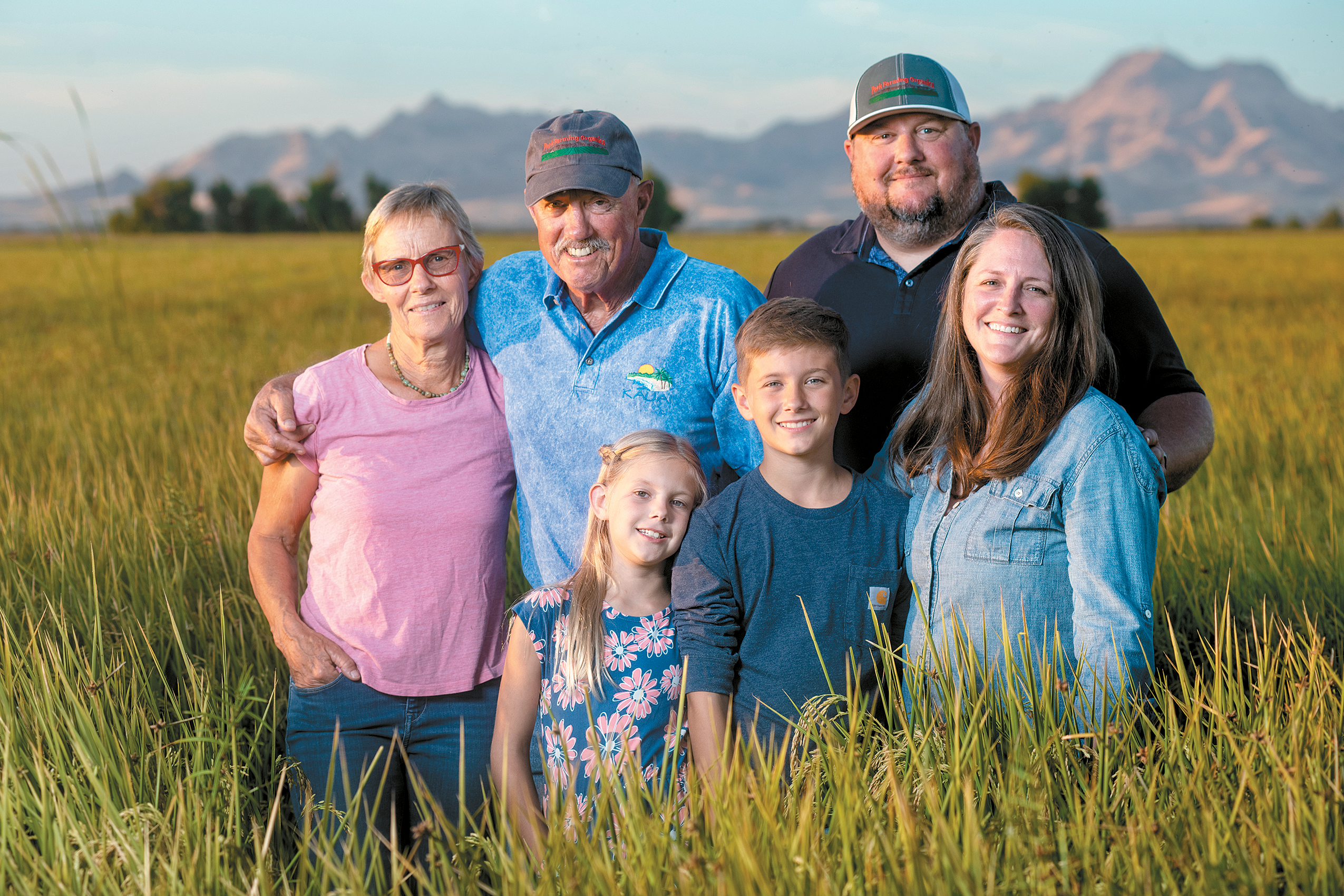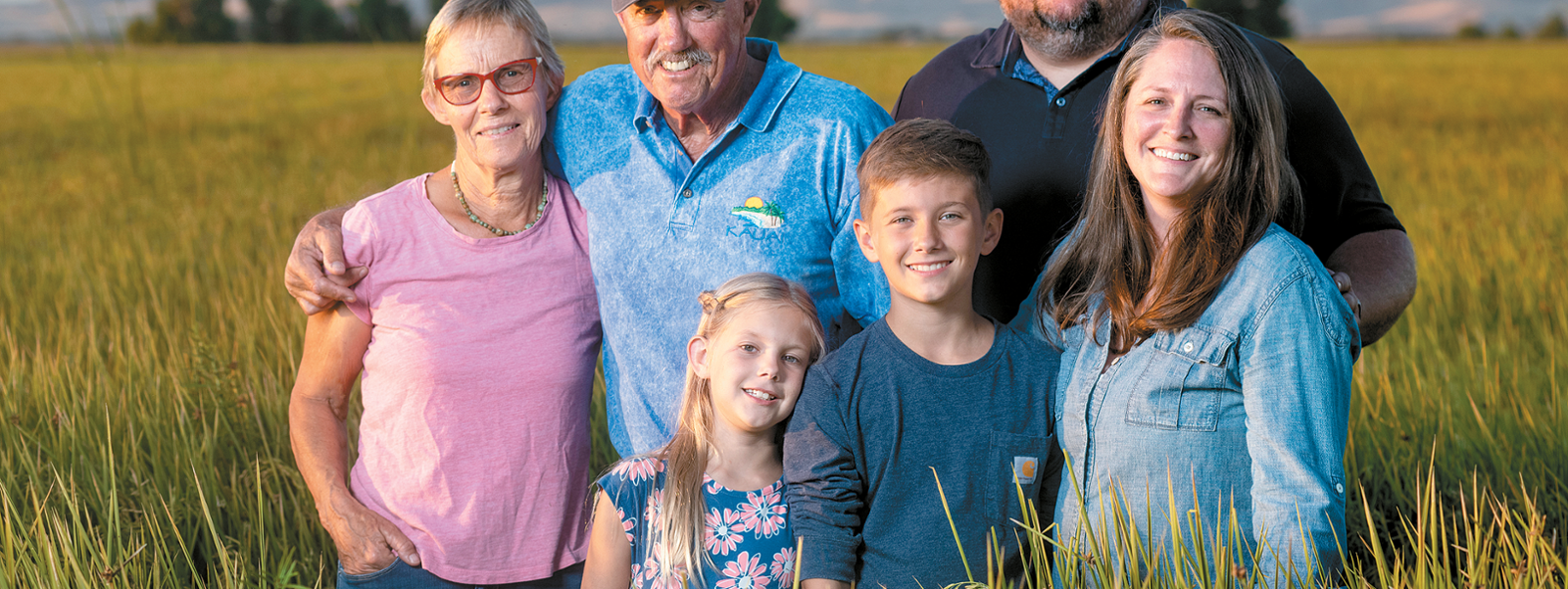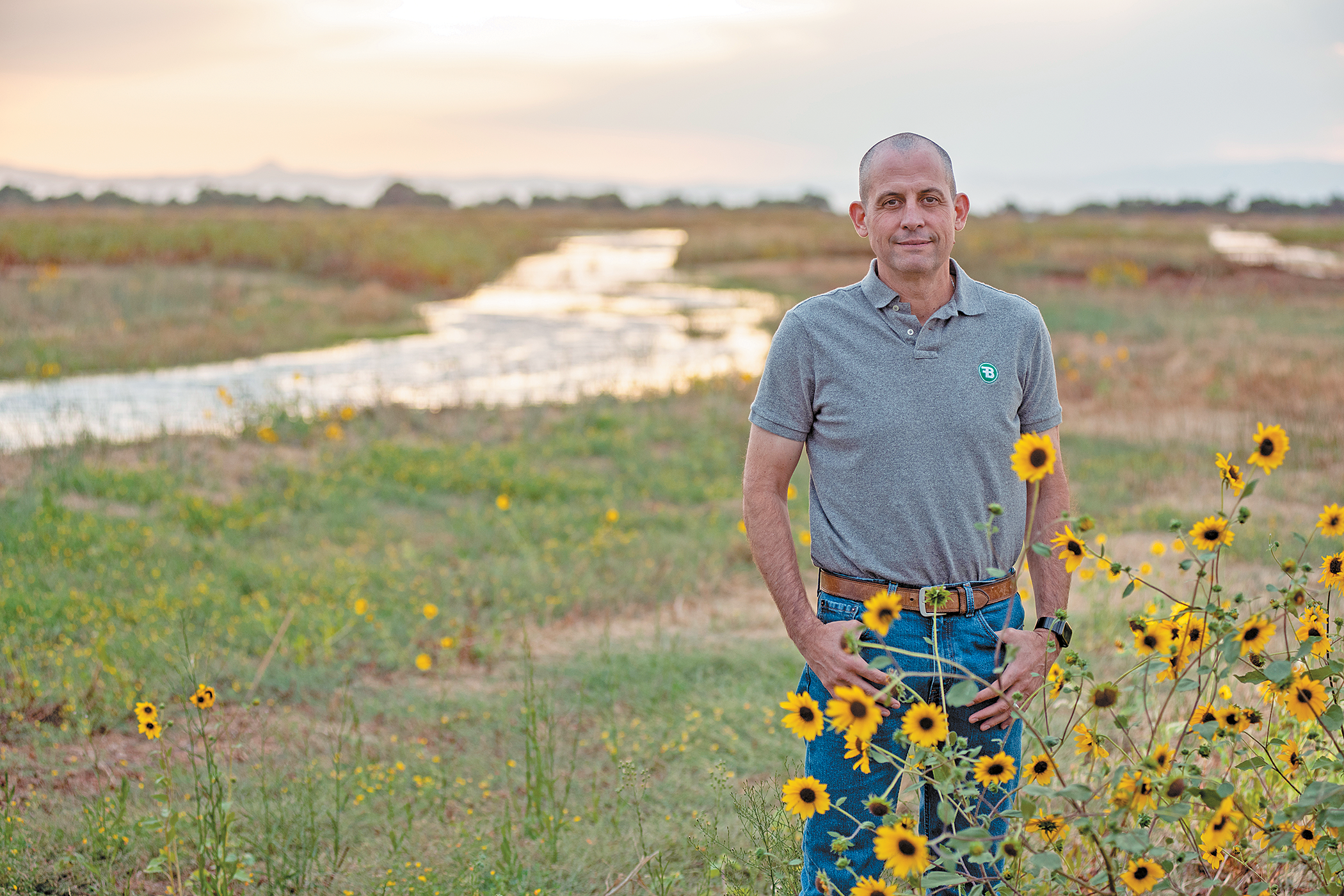Sutter County farm honored with top conservation prize

The 2023 Leopold Conservation Award went to Park Farming Organics in Sutter County. The farm is run by Brian Park, right, and his wife Jamie, shown with their children Corbin and Hannah. Brian’s parents, Scott and Ulla Park, remain consultants.
Photo/Paulo Vescia


Photo/Paulo Vescia
By Ching Lee
Farmers are used to Mother Nature throwing curveballs. Because they work with the land and other natural resources, they understand they must adapt to the unexpected. They also recognize that how they choose to farm and the practices they implement can build resilience, with lasting impacts beyond the current season and the borders of their farm.
Each year, the Leopold Conservation Award recognizes farmers and ranchers for their achievements in environmental stewardship. Given in honor of renowned conservationist Aldo Leopold, the award celebrates their efforts in managing and improving the land under their care.
For this year’s award finalists, doing what’s right for the environment has shown to benefit not just the land and its inhabitants but also their businesses and the bottom line.
The 2023 award went to Park Farming Organics in Sutter County.
“We feel like our ground gets better every year, and I think that’s a real important question that every farmer should ask themselves: Is your field in better condition the following year?” Brian Park said. “We want to be able to leave every field and the earth better than we found it.”
Bowles Farming Co. in Merced County, owned by the Bowles and Lawrence families, was an award finalist.
The Leopold Conservation Award in California is made possible by American Farmland Trust, Sustainable Conservation, California Farm Bureau, Sand County Foundation, The Harvey L. & Maud C. Sorensen Foundation, Farm Credit, The Nature Conservancy in California, McDonald’s and California Leopold Conservation Award recipient alumni.
Scott Park acknowledged the unconventional way he and his son, Brian, farm was neither planned nor imaginable when he planted his first field of processing tomatoes in 1974.
During his early years, the first-generation farmer said he imitated other growers’ “use of powerful tillage equipment and ample visits to the chemical storage room.” But when his production plateaued, yet he was spending, spraying and tilling more, he began to doubt the sensibility of his practices.
He decided to break from the norm in 1986 by incorporating after-harvest wheat straw in the field rather than burning or baling it. The idea came after he worked on land in which the owner had used organic matter in the soil, crop rotation, and minimal tillage and synthetic products. The ground was unlike the “brick” soil structure he was used to.
“Maybe what everyone else was doing was not the best way to farm,” Scott Park recalled thinking.
Today, with Brian Park and his wife Jamie managing the farm, maintaining soil health remains the cornerstone of the Parks’ farming philosophy.
Rather than focusing on boosting crop yield, they emphasize upholding practices such as crop rotation, maintaining crop diversity, and building biomass and microbial life in the soil.
They said thoughtful nurturing of the soil increases its fertility while warding off insect pests and plant diseases. This reduces the need for pesticides and fertilizers, which lowers their costs. The improved water-holding capacity of the soil also makes plants more resilient.
“Making the soil healthier sounds corny,” Scott Park said, “but it really solves almost all our problems.”
Building healthy soil requires patience, the Parks stressed. Because it does not happen overnight, income can take a beating during the transition. But after a couple of years, Brian Park said the field becomes profitable, producing yields comparable to or better than conventional methods, with quality crops that keep buyers coming back.
“Being a good steward of the land is the avenue to sustainable profit,” Scott Park said.
Park Farming Organics became one of the first mixed-crops farms in the state to be certified regenerative organic in 2022; the farm received its first organic certification in 1995. In addition to meeting standards on soil health, certified regenerative organic farms must demonstrate social fairness in how they treat employees.
The Parks agree that paying employees a living wage, providing health insurance and retirement benefits, and sharing profits and bonuses simply make good business sense. They said their employees feel invested in the farm and want to see it succeed.
“The better we take care of our employees, the better the farm runs,” Brian Park said.
Long before conservation became a modern movement, Bowles Farming Co. founder Henry Miller in 1870 worked to protect what was then the last known group of tule elk hiding on his land, a working ranch surrounded by wetlands and wildlife habitat. As the ranch’s elk population grew in the early 1900s, the animals were moved to other sites to begin their re-establishment.
Today, the elk residing at San Luis National Wildlife Refuge Complex near the farm’s headquarters can be traced to Miller’s preservation efforts. Bowles Farming continues to make conservation a core focus of its business. It actively maintains 640 acres of wetland habitat, which has been under a conservation easement since the 1970s to ensure the property remains that way.
“We’ve been farming in a very unique area, which makes us think more about the natural system around us,” said Cannon Michael, president of Bowles Farming and grandson of one of the founders, Henry Bowles.
The farm has restored key riparian corridors in areas not used for producing crops. By managing invasive weeds and growing native plants there, Michael said the land provides refuge for pollinators, birds and other terrestrial species that the farm relies on for its cropping system. For example, creating habitat for birds such as hawks and owls has helped to solve the farm’s problems with gophers, which chew on irrigation drip tape and do other damage.
“We wanted to make sure that land is as valuable as possible to the local ecosystem,” Michael said.
The farm started Great Valley Seed, a company that produces seeds for more than 70 species of native plants. Some of the seeds are used for the farm’s own restoration work, while other seeds are sold to farmers and other landowners doing pollinator projects.
In 2016, a full-scale composting center was added to the farm to turn 1,800 truckloads of green waste a year from surrounding cities and counties into soil amendments. The farm uses most of the compost, though some of it is sold to neighbors and other farmers. Michael said using compost decreases the farm’s reliance on synthetic fertilizer. It also increases the water-holding capacity of the soil, which helps plants grow.
“It’s positive for the state of California because we’re taking that (green waste) away from the landfills, and it’s positive for the farm because we’re improving our soil and our productivity and using less inputs,” he said.
When the farm transitioned to using drip irrigation to be more efficient with its water use, it also invested in solar infrastructure to reduce reliance on the grid and to generate enough green energy to power its water conservation efforts.
Though supporting the environment has been key to the farm’s resilience, Michael said perhaps more important is the company’s investment in its employees. Through its leadership program, the farm has promoted some of its salaried workers to the farm’s management team. The farm also pays for the school supplies of its employees’ children and grandchildren and runs a scholarship program for those entering college or trade school.
“On the farm, we transform seeds into food and fiber, and we also get a chance to help transform people into what they want to achieve and help their kids achieve,” Michael said. “It’s just a rewarding part of employing people, is empowering them and empowering their children.”
(Ching Lee is an assistant editor of Ag Alert. She may be contacted at clee@cfbf.com.)




